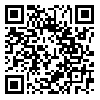Volume 35, Issue 139 (January 2023)
IJN 2023, 35(139): 534-543 |
Back to browse issues page
Download citation:
BibTeX | RIS | EndNote | Medlars | ProCite | Reference Manager | RefWorks
Send citation to:



BibTeX | RIS | EndNote | Medlars | ProCite | Reference Manager | RefWorks
Send citation to:
Dehnavi M, Sanaee H, Shariat Nejad K, Ayatnia M, Mohammadi M, Ghanbari Moghaddam A. Resilience Level of the Family Caregivers of the Elderly in Mashhad, Iran During the COVID-19 Pandemic. IJN 2023; 35 (139) :534-543
URL: http://ijn.iums.ac.ir/article-1-3603-en.html
URL: http://ijn.iums.ac.ir/article-1-3603-en.html
Mahdie Dehnavi1 

 , Hossein Sanaee1
, Hossein Sanaee1 
 , Keyvan Shariat Nejad2
, Keyvan Shariat Nejad2 
 , Mohammad Ayatnia3
, Mohammad Ayatnia3 
 , Mojtaba Mohammadi4
, Mojtaba Mohammadi4 
 , Akram Ghanbari Moghaddam5
, Akram Ghanbari Moghaddam5 




 , Hossein Sanaee1
, Hossein Sanaee1 
 , Keyvan Shariat Nejad2
, Keyvan Shariat Nejad2 
 , Mohammad Ayatnia3
, Mohammad Ayatnia3 
 , Mojtaba Mohammadi4
, Mojtaba Mohammadi4 
 , Akram Ghanbari Moghaddam5
, Akram Ghanbari Moghaddam5 


1- Department of Nursing and midwifery, Research Center for Nursing and Midwifery Care, Faculty of Nursing & Midwifery, Mashhad University of Medical Sciences, Mashhad, Iran.
2- Department of Epidemiology and Biostatistics, Faculty of Health, Mashhad University of Medical Sciences, Mashhad, Iran.
3- Shahid Mohammad Vasei educational-therapeutic center, abzevar University of Medical Sciences, Sabzevar, Iran.
4- Department of Nursing and midwifery, Sabzevar Aging Research Center, Faculty of Nursing & Midwifery, Sabzevar University of Medical Sciences, Sabzevar, Iran.
5- Department of Operating Room and Anesthesia, Nursing and Midwifery Research Center, Faculty of Nursing and Midwifery, Mashhad University of Medical Sciences, Mashhad, Iran. ,ghanbarima@mums.ac.ir
2- Department of Epidemiology and Biostatistics, Faculty of Health, Mashhad University of Medical Sciences, Mashhad, Iran.
3- Shahid Mohammad Vasei educational-therapeutic center, abzevar University of Medical Sciences, Sabzevar, Iran.
4- Department of Nursing and midwifery, Sabzevar Aging Research Center, Faculty of Nursing & Midwifery, Sabzevar University of Medical Sciences, Sabzevar, Iran.
5- Department of Operating Room and Anesthesia, Nursing and Midwifery Research Center, Faculty of Nursing and Midwifery, Mashhad University of Medical Sciences, Mashhad, Iran. ,
Abstract: (3390 Views)
Background & Aims Resilience is defined as a person’s ability to maintain psychological balance and recover from challenging conditions. Due to the very important role of family caregivers in the treatment of older patients with COVID-19, attention to their health and well-being has been increased. This study aims to determine the resilience level of the family caregivers of older people during COVID-19 pandemic in Mashahd, Iran.
Materials & Methods This descriptive-analytical study was conducted on 120 family caregivers of older people who referred to urban health centers in Mashhad, Iran. Sampling was done in using cluster random sampling method from April to June 2022. The instrument was a two-part questionnaire included demographic form (surveying age of the elderly and caregiver, gender of caregiver, educational level of caregiver, employment status of caregiver, marital status of caregiver, and the relation of caregiver with the elderly) and the Connor-Davidson resilience scale. Data analysis was done in SPSS v.23 software using descriptive and inferential statistics.
Results The mean age of family caregivers and elderly were 39.94±1.32 and 74.44±3.17 years, respectively. The age of caregivers ranged 20-74 years and the age of the elderly ranged 60-89 years. The mean resilience score of caregivers was 49.40±13.07, which is low. There was a significant relationship between resilience score and educational level (P<0.05), marital status (P<0.001) and employment status of family caregivers (P<0.05). The correlation between resilience and caregiver’s age (r=0.17) and elderly’s age (r=0.13) was positive, but weak.
Conclusion Family caregivers of the elderly in Mashhad city have low resilience. Their educational level, employment status, and marital status are related to their resilience level. Attention to these factors can help health care providers to develop plans for increasing their resilience and improving the quality of life of the elderly.
Materials & Methods This descriptive-analytical study was conducted on 120 family caregivers of older people who referred to urban health centers in Mashhad, Iran. Sampling was done in using cluster random sampling method from April to June 2022. The instrument was a two-part questionnaire included demographic form (surveying age of the elderly and caregiver, gender of caregiver, educational level of caregiver, employment status of caregiver, marital status of caregiver, and the relation of caregiver with the elderly) and the Connor-Davidson resilience scale. Data analysis was done in SPSS v.23 software using descriptive and inferential statistics.
Results The mean age of family caregivers and elderly were 39.94±1.32 and 74.44±3.17 years, respectively. The age of caregivers ranged 20-74 years and the age of the elderly ranged 60-89 years. The mean resilience score of caregivers was 49.40±13.07, which is low. There was a significant relationship between resilience score and educational level (P<0.05), marital status (P<0.001) and employment status of family caregivers (P<0.05). The correlation between resilience and caregiver’s age (r=0.17) and elderly’s age (r=0.13) was positive, but weak.
Conclusion Family caregivers of the elderly in Mashhad city have low resilience. Their educational level, employment status, and marital status are related to their resilience level. Attention to these factors can help health care providers to develop plans for increasing their resilience and improving the quality of life of the elderly.
Type of Study: Research |
Subject:
nursing
Received: 2022/08/17 | Accepted: 2022/12/22 | Published: 2022/12/22
Received: 2022/08/17 | Accepted: 2022/12/22 | Published: 2022/12/22
Send email to the article author
| Rights and permissions | |
 |
This work is licensed under a Creative Commons Attribution-NonCommercial 4.0 International License. |




